#a black asexual lens on our sex-obsessed culture
Text
June 8 2023
For pride month, I’ve begun reading two books: the Nico di Angelo solo book and a book about asexuality from the perspective of a black woman. The first I finally got my grabbers on when at the mall recently, it has taken me a little over a month to read about my favourite goth gay demigod and I feel bad for letting him wait. The second sounded interesting since it’s a perspective we don’t hear about often– intersectionality ftw. I am enjoying both books so far.
#transgender#transmasc#nonbinary#queer literature#lgbtq literature#pride month#the sun and the star#riordanverse#asexuality#refusing compulsory sexuality#a black asexual lens on our sex-obsessed culture#sherronda brown#late entry#entry#findingmicah
1 note
·
View note
Text
As with other identity labels, asexual is not prescriptive of behavior; it is a tool. People are free to use the term to help better understand themselves and find community with others who also find the label to be accurate. It is unfortunately quite true that labels can sometimes feel as carceral as they do liberating. But ideas don't put us in a box. Ideas do. For many of us, it is in asexuality that we find the affirmation we have always needed but were never afforded by any other language. We have taken hold of the part of our being, or are we coming, that has long been nameless, and have given it a name.
-Sheronda J. Brown, Refusing Compulsory Sexuality: A Black Asexual Lens on Our Sex-Obsessed Culture
#sherronda j brown#refusing compulsory sexuality#Refusing compulsory sexuality a black asexual lens on our sex obsessed culture#asexual#asexuality#ace stuff#safeforace#queer books#lgbtqia
487 notes
·
View notes
Text
Happy International Asexuality Day 2023!
Happy International Asexuality Day! Today we’re celebrating books with main characters all along the ace spectrum, so check out these titles and find your perfect next read! As usual, all links are affiliate and earn a percentage of income for the site, so please use them if you can!
Please note this roundup only features titles that were not previously featured [with covers] in past…
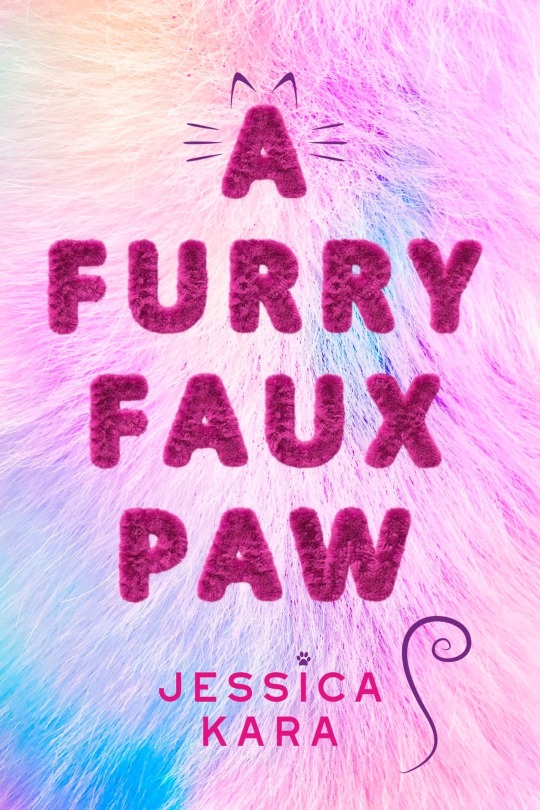
View On WordPress
#Ace-Spec#Ann Zhao#Anna Zabo#Asexual#Asexuality#Dear Wendy#Emma K. Ohland#Here Goes Nothing#Jax Meyer#Just Lizzie#Karen Wilfrid#Love Letters for Joy#Maggie Tokuda-Hall#Racquel Marie#Refusing Compulsory Sexuality: A Black Asexual Lens on Our Sex-Obsessed Culture#Rising from Ash#Sherronda J. Brown#Wren Martin Ruins it All#You Don&039;t Have a Shot
70 notes
·
View notes
Text
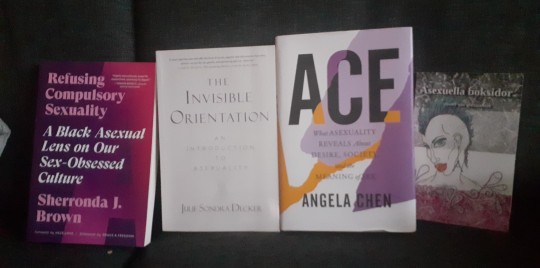

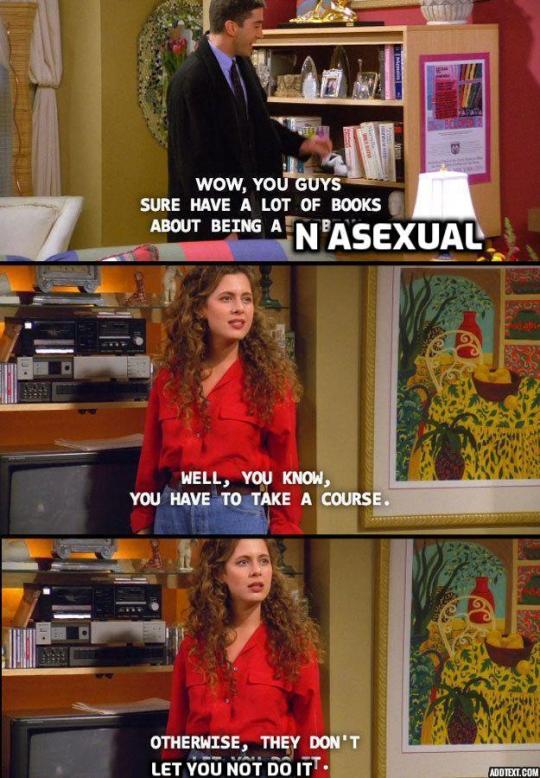
Ace non-fiction
#asexual#angela chen#sherronda j brown#asexuella boksidor#julie sondra decker#the invisible orientation#ace what asexuality reveals about desire society and the meaning of sex#refusing compulsory sexuality#a black asexual lens on our sex obsessed culture#susan bunch#friends meme#english#på svenska
33 notes
·
View notes
Text
REFUSING COMPULSORY SEXUALITY | ARC REVIEW
REFUSING COMPULSORY SEXUALITY: A BLACK ASEXUAL LENS ON OUR SEX-OBSESSED CULTURE BY SHERRONDA J. BROWN ★★★★★
Expected release date: 13 September 2022
Genre: Nonfiction, Psychology, LGBTQ+, Race
Summary:
In this exploration of what it means to be Black and asexual in America today, Sherronda J. Brown offers new perspectives on asexuality. She takes an incisive look at how anti-Blackness, white supremacy, patriarchy, heteronormativity, and capitalism enact harm against asexual people, contextualizing acephobia within a racial framework in the first book of its kind. Brown advocates for the “A” in LGBTQIA+, affirming that to be asexual is to be queer--despite the gatekeeping and denial that often says otherwise. (Storygraph)
[Storygraph] [Goodreads] [Amazon]

My review: (spoiler-free)
Refusing Compulsory Sexuality is by far the most compelling and important book I have read in my lifetime and I will never stop recommending it to others. As someone who reads a lot about sexuality and gender, I wondered how much I would actually learn by reading this. The answer? I learned a lot. Despite its American focus, the topics are universal enough to indulge an international audience.
The book explores a great variety of topics, talking, for instance, about both historical and modern views on Black asexuality, the ways capitalism and white cisheteropatriarchy instilled many problematic ideas in society, and a lot about sex and the history of its traditional gender roles. Each chapter is eye-opening and has taught me more than I ever expected one book could do.
Brown uses content warnings in all chapters to mark spoilers and to announce triggering topics which is very helpful, especially seeing how a lot of the chapters discuss heavier topics. The book uses inclusive language and reading it felt like a very inviting learning experience. One problem I had is that there’s a lot of repetition of certain ideas which can make the book feel longer, however, it is a great way to drive home vital points and themes throughout the book so it certainly didn’t hinder my reading experience.
If you have any interest in race, gender and/or sexuality, this is the book for you. There are many specific terms used that can make reading the book a bit more difficult, but the language isn’t entirely inaccessible and still enjoyable enough to get through easily. An important piece of nonfiction that I hope will reach many people’s bookshelves!
*Thank you to NetGalley and the publisher for a chance to read an ARC of this book for free, in exchange for an honest review.*
#arc review#arc reviews#arc#arcs#book review#book reviews#bookblr#review blog#netgalley#refusingcompulsorysexuality#refusing compulsory sexuality#refusing compulsory sexuality: a black asexual lens on our sex-obsessed culture#2022 releases#lgbtq#lgbtq+#lgbtqiap+#asexuality#nonfiction#race#gender#queer#feminism#sherronda j. brown#ace
3 notes
·
View notes
Text

Excerpt from Refusing Compulsory Sexuality: A Black Asexual Lens on Our Sex-Obsessed Culture by Sherronda J. Brown.
3K notes
·
View notes
Text
I’m actually serious about this, if at all possible, right now is a very good time to request queer books from your local library. Whether they get them or not is not in your control, but it is so important to show that there is a desire for queer books. I will also say getting more queer books in libraries and supporting queer authors are pretty fantastic byproducts of any action.
This isn’t something everyone can do, but please do see if you are one of the people who has the privilege to engage in this form of activism, and if you are, leverage that privilege for all you’re worth.
For anyone who can’t think of a queer book to request, here is a little list of some queer books that I think are underrated and might not be in circulation even at larger libraries:
Refusing Compulsory Sexuality: A Black Asexual Lens on Our Sex-Obsessed Culture by Sherronda J. Brown
Silver Under Nightfall by Rin Chupeco
Harvard's Secret Court: The Savage 1920 Purge of Campus Homosexuals by William Wright
The Perks of Loving a Wallflower by Erica Ridley
God Themselves by Jae Nichelle
IRL by Tommy Pico
The Pink Line: Journeys Across the World's Queer Frontiers by Mark Gevisser
Passing Strange by Ellen Klages
The New Queer Conscience by Adam Eli
Fierce Femmes and Notorious Liars: A Dangerous Trans Girl's Confabulous Memoir by Kai Cheng Thom
Queering the Tarot by Cassandra Snow
Wash Day Diaries by Jamila Rowser
Queer Magic: Lgbt+ Spirituality and Culture from Around the World by Tomás Prower
Before We Were Trans: A New History of Gender by Kit Heyam
Beyond the Pale by Elana Dykewomon
Hi Honey, I'm Homo! by Matt Baume
The Deep by Rivers Solomon
Homie: Poems by Danez Smith
The Secret Life of Church Ladies by Deesha Philyaw
The Companion by E.E. Ottoman
Kapaemahu by Dean Hamer, Joe Wilson, Hinaleimoana Wong-Kalu
Sacrament of Bodies by Romeo Oriogun
Witching Moon by Poppy Woods
Tell Me I'm Worthless by Alison Rumfitt
Dead Collections by Isaac Fellman
Disintegrate/Dissociate by Arielle Twist
Dear Senthuran: A Black Spirit Memoir by Akwaeke Emezi
Peaches and Honey by Imogen Markwell-Tweed
Nepantla: An Anthology Dedicated to Queer Poets of Color by Christopher Soto
#queer books#queer history#lgbt history#honestly#libraries are a massive resource in terms of preserving and uplifting marginalized narratives#and as a community#that has been so very excluded from both fictional and nonfictional narratives#this is a great way to reclaim and care for the stories that have been surpressed for so long
11K notes
·
View notes
Text
Asexual Non-Fiction
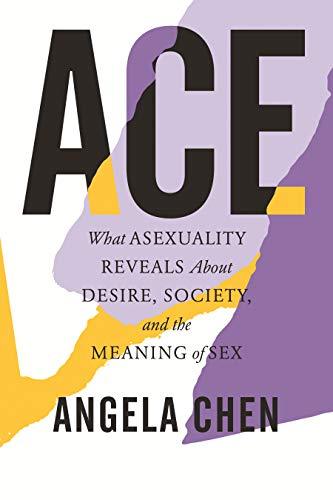

Ace: What Asexuality Reveals About Desire, Society, and the Meaning of Sex by Angela Chen
An engaging exploration of what it means to be asexual in a world that's obsessed with sexual attraction, and what we can all learn about desire and identity by using an ace lens to see the world. Through interviews, cultural criticism, and memoir, ACE invites all readers to consider big-picture issues through the lens of asexuality, because every place that sexuality touches our world, asexuality does too.
The Invisible Orientation: An Introduction to Asexuality by Julie Sondra Decker
In The Invisible Orientation, Julie Sondra Decker outlines what asexuality is, counters misconceptions, provides resources, and puts asexual people's experiences in context as they move through a very sexualized world. It includes information for asexual people to help understand their orientation and what it means for their relationships, as well as tips and facts for those who want to understand their asexual friends and loved ones.

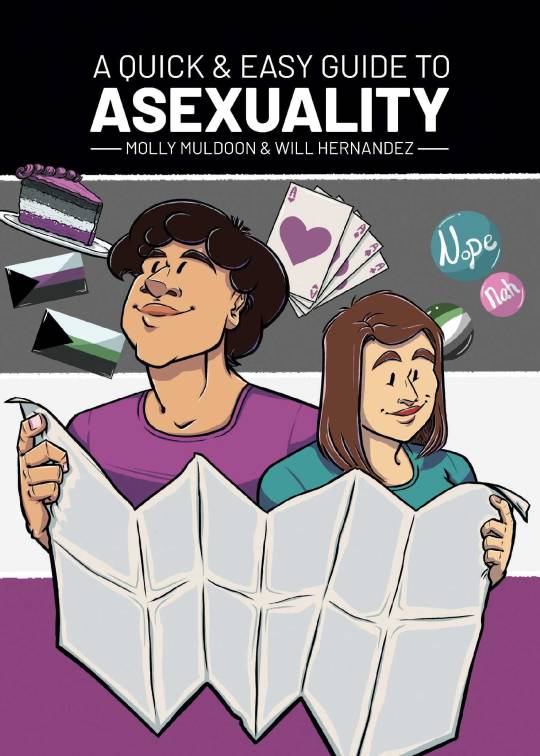
How to Be Ace: A Memoir of Growing Up Asexual by Rebecca Burgess
In this brave, hilarious and empowering graphic memoir, we follow Rebecca as they navigate a culture obsessed with sex—from being bullied at school and trying to fit in with friends, to forcing themself into relationships and experiencing anxiety and OCD—before coming to understand and embrace their asexual identity.
A Quick & Easy Guide to Asexuality by Molly Mulldoon and Will Hernandez
Writer Molly Muldoon and cartoonist Will Hernandez, both in the ace community, are here to shed light on society’s misconceptions of asexuality and what being ace is really like. This book is for anyone who wants to learn about asexuality, and for Ace people themselves, to validate their experiences. Asexuality is a real identity and it’s time the world recognizes it. Here’s to being invisible no more!


Asexualities: Feminist and Queer Perspectives edited by Karli June Cerankowski and Megan Milks
As the first book-length collection of critical essays ever produced on the topic of asexuality, this book serves as a foundational text in a growing field of study. It also aims to reshape the directions of feminist and queer studies, and to radically alter popular conceptions of sex and desire. Including units addressing theories of asexual orientation; the politics of asexuality; asexuality in media culture; masculinity and asexuality; health, disability, and medicalization; and asexual literary theory, Asexualities will be of interest to scholars and students in sexuality, gender, sociology, cultural studies, disability studies, and media culture.
Refusing Compulsory Sexuality: A Black Asexual Lens on Our Sex-Obsessed Culture by Sherronda J. Brown
In this exploration of what it means to be Black and asexual in America today, Sherronda J. Brown offers new perspectives on asexuality. She takes an incisive look at how anti-Blackness, white supremacy, patriarchy, heteronormativity, and capitalism enact harm against asexual people, contextualizing acephobia within a racial framework in the first book of its kind. A necessary and unapologetic reclamation, Refusing Compulsory Sexuality is smart, timely, and an essential read for asexuals, aromantics, queer readers, and anyone looking to better understand sexual politics in America.
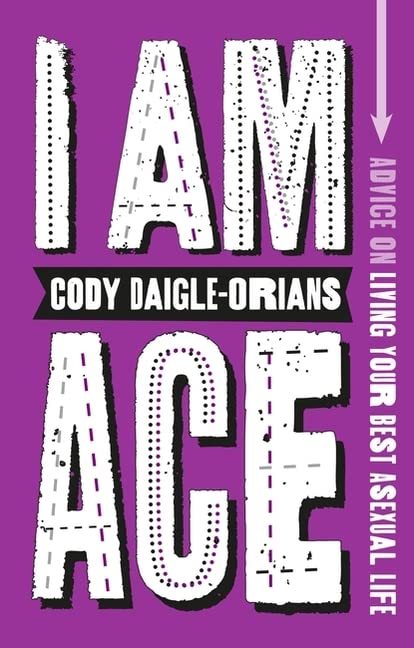

I Am Ace: Advice on Living Your Best Asexual Life by Cody Daigle-Orians
Within these pages lie all the advice you need as a questioning ace teen. Tackling everything from what asexuality is, the asexual spectrum and tips on coming out, to intimacy, relationships, acephobia and finding joy, this guide will help you better understand your asexual identity alongside deeply relatable anecdotes drawn from Cody's personal experience. Whether you are ace, demi, gray-ace or not sure yet, this book will give you the courage and confidence to embrace your authentic self and live your best ace life.
Ace Voices: What it Means to Be Asexual, Aromantic, Demi or Grey-Ace by Eris Young
Drawing upon interviews with a wide range of people across the asexual spectrum, Eris Young is here to take you on an empowering, enriching journey through the rich multitudes of asexual life. With chapters spanning everything from dating, relationships and sex, to mental and emotional health, family, community and joy, the inspirational stories and personal experiences within these pages speak to aces living and loving in unique ways. Find support amongst the diverse narratives of aces sex-repulsed and sex-favourable, alongside voices exploring what it means to be black and ace, to be queer and ace, or ace and multi-partnered - and use it as a springboard for your own ace growth.
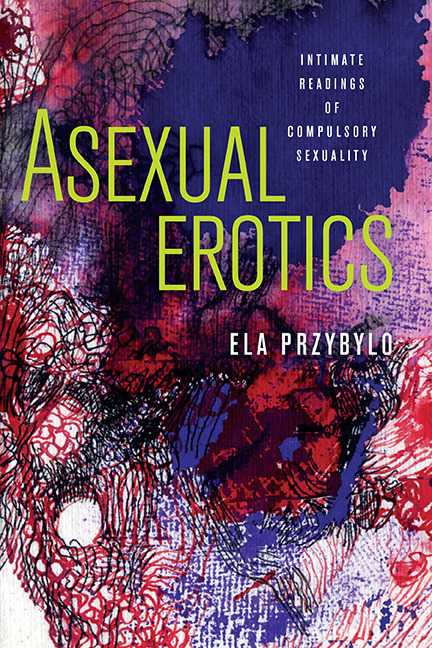

Asexual Erotics: Intimate Readings of Compulsory Sexuality by Ela Przybylo
Through a wide-ranging analysis of pivotal queer, feminist, and anti-racist movements; television and film; art and photography; and fiction, nonfiction, and theoretical texts, each chapter explores asexual erotics and demonstrates how asexuality has been vital to the formulation of intimate ways of knowing and being. Asexual Erotics assembles a compendium of asexual possibilities that speaks against the centralization of sex and sexuality, asking that we consider the ways in which compulsory sexuality is detrimental not only to asexual and nonsexual people but to all.
Ace Notes by Michele Kirichanskaya
As an ace or questioning person in an oh-so-allo world, you're probably in desperate need of a cheat sheet. Covering everything from coming out, explaining asexuality and understanding different types of attraction, to marriage, relationships, sex, consent, gatekeeping, religion, ace culture and more, this is the ultimate arsenal for whatever the allo world throws at you.


Ace and Aro Journeys: A Guide to Embracing Your Asexual or Aromantic Identity by The Ace and Aro Advocacy Project
Join the The Ace and Aro Advocacy Project (TAAAP) for a deep dive into the process of discovering and embracing your ace and aro identities. Empower yourself to explore the nuances of your identity, find and develop support networks, explore different kinds of partnership, come out to your communities and find real joy within. Combining a rigorous exploration of identity and sexuality models with hundreds of candid and poignant testimonials - this companion vouches for your personal truth, wherever you lie on the aspec spectrum.
Sounds Fake But Okay: An Asexual and Aromantic Perspective on Love, Relationships, Sex, and Pretty Much Anything Else by Sarah Costello and Kayla Kaszyca
Drawing on Sarah and Kayla's personal stories, and those of aspec friends all over the world, prepare to explore your microlabels, investigate different models of partnership, delve into the intersection of gender norms and compulsory sexuality and reconsider the meaning of sex - when allosexual attraction is out of the equation.
2K notes
·
View notes
Text
Aromanticism in Academia
Since it's currently Aromantic Spectrum Awareness Week and I'm currently in the middle of a master's research project about aromanticism and asexuality, I figured I'd contribute by putting together a list of some books and other academic sources I've read so far that deal with aromanticism! There's very little written about aromanticism in academia, so I think it's important to spotlight what we do have.
DISCLAIMER BEFORE THE LIST: Due to the lack of discussion of aromanticism specifically in academia, most of what I've found are texts that are primarily about asexuality but also discuss aromanticism. It's unfortunate, but it is also where we're kind of at right now in terms of academia, so bear that in mind.
Books:
Ace Voices: What it means to be asexual, aromantic, demi, or grey-ace by Eris Young - Definitely has the most focus on aromanticism of everything that I've read so far, this book draws from a combination of the author's personal experiences and interviews with other members of the a-spec community, including aroace and alloaro people. A good source of discussion of aro issues and how they interact with things like gender stereotypes. Also notable for its discussion of QPRs, a topic which I find has generally been ignored in academia about a-spec identities.
Ace: What Asexuality reveals about desire, society, and the meaning of sex by Angela Chen - Primarily deals with asexuality, as the title suggests, but also contains some relevant discussions of aromanticism, including the experiences of aroallo people. If you're going to check out the book, I would especially recommending looking at chapter 7: Romance, Reconsidered, which features most of the discussion of aromanticism and non-normative relationships
Refusing Compulsory Sexuality: A Black Asexual Lens on our Sex-Obsessed Culture by Sherronda J Brown - Again, asexuality is the main focus here, but I would still recommend checking out this book as it does still contain some useful discussion of aromanticism, particularly an extended critique of "singlism" (i.e. discrimination of single people) and how it is weaponised against aros. I also find Brown's criticism of the dehumanisation of aromanticism in media to be very compelling!
Minimizing Marriage: Marriage, Morality, and the Law - I would be remiss not to mention Brake's work here. While Minimizing Marriage is not specificallly about aromanticism and deals with marriage reform and the concept of amatonormativity more broadly, I think it's fair to say that many of Brake's ideas (particularly her coining of amatonormativity as a term) have become vital to the aro community and aro activism in recent years. Definitely a must-read for anyone interested in deconstructing amatonormativity and in contemporary critiques of marriage as an institution, though it's worth noting that this is a work of moral/political philosophy first and foremost, and as such it gets very into the weeds of things. Available on the Internet Archive here
Academic Articles/Essays (all can be found in the collection Asexualities: Feminist and Queer Perspectives):
"Why didn't you tell me that I love you?": Asexuality, Polymorphous Perversity, and the Liberation of the Cinematic Clown by Andrew Grossman - A really interesting and engaging analysis of the archetype of the silent film clown, and how it can be read as an a-spec figure. While Grossman uses the language of asexuality, his analysis makes it clear that he is looking at the clown as both an asexual AND aromantic character.
On the Racialization of Asexuality by Ianna Hawkins Owen - A personal favourite of mine. I think many parts of this essay will be very relevant to aromantic people, particularly Owen's investigation of how romantic love came to be pedastalised and her critique of attempts to normalise asexuality by distancing it from aromanticism.
Mismeasures of Asexual Desires by Jacinthe Flore - A critique of the pathologisation of asexuality that also discusses how aromanticism challenges common discourses around intimate relationships
Finally, I would like to mention the work of Bella DePaulo, who has written extensively about singlism and compulsory coupling, and who Brown uses extensively as a source in their writing on aromanticism. I didn't want to make this part of the main list because I haven't yet had a chance to get stuck into DePaulo's work, but based on Brown's mentions of her work I believe she has some very interesting ideas that are very relevant to aro people.
As you can probably tell, the list of academic sources dealing with aromanticism and aro issues is very limited. However, while aromanticism is vastly underdiscussed in an academic context, I'd like to point out that this is also only what I've been able to find so far. If anyone has any other recommendations please do add them to this post - I for one would love to hear about them!
#aro shtuff#asaw 2024#aromantic awareness week#asaw#aromantic spectrum awareness week#aromantic#ifer rambles#also if u guys have recommendations for aro academia it would be very helpful for me personally#so y'know. there's that#grad school tag
57 notes
·
View notes
Text
"During my freshman year of college, my psychology professor said, 'Everything is about sex. You are here, at this university, in this class, because you want to have sex...You came to college so that you can go to parties, meet people, and have sex. And so that you can graduate with a degree that will allow you to get a good job so that you can be an eligible dating and marriage prospect, and have sex.' All around me, heads nodded while I sat in confusion, unable to wrap my head around the assertion that everything is about sex.
I was already exceedingly aware of the fact that my lack of investment in seeking out sexual encounters alienated me from my college peers, especially because some of the people closest to me made it clear, in one way or another, that there was something 'abnormal' about this, about me. They viewed me as immature and undeveloped; some even pitied me. I needed to 'grow up' or else I would 'end up alone,' they’d warn. I referred to myself as a 'late bloomer' for many subsequent years, often as a sort of apology or disclaimer. Only after affirming my asexuality did I understand that this 'late bloomer' rhetoric was an unhelpful sentiment and a reinforcement of the same ideologies that caused others to treat me like an abnormality in the first place. One does not 'bloom'—as in, enter into sexual exploration—too late, because there is no set time frame in which one must 'bloom.' One is not required to 'bloom' in this way at all.
Infantilization is a dehumanizing process by which a self-righteous sense of superiority is wielded over someone seen as inferior—assumed to be less mature, more naive, and less worthy of respect. It’s closely akin to and often comes with a heaping side of patronization and condescension, with the infantilized being spoken to and treated as if they are unintelligent, unimportant, deserving of pity, and in need of guidance and education from those who are allegedly more superior and more knowledgeable about the world. This often manifests as the infantilizer regarding themselves as more qualified to make decisions on behalf of and about the infantilized, whom they regard as childlike and incapable of making these determinations on their own...
According to one study, 'Societal Challenge and Depression, Self-Esteem and Self-Concept Clarity in Asexuals,' 69.4 percent of the asexual participants report having had their identity challenged, and the vast majority of those challenges came in the form of infantilization, with phrases like 'you are a late bloomer' or 'you have not met the right person yet' being offered in response to them revealing their asexuality or simply being noticeably disinterested in sex. The association of asexuals with childishness and immaturity reproduces much of the same disregard and dismissive attitudes that are typically directed toward actual children. I understand the infantilization of asexuals as its own brand of gaslighting, in which seeds of doubt are continually planted in our minds and cause many of us to question our experiences, desires, and perception of self.
-Sherronda J. Brown, Refusing Compulsory Sexuality: A Black Asexual Lens on Our Sex-Obsessed Culture
75 notes
·
View notes
Note
Oh I’m very very interested in your nonfiction book recs 👀
EDIT: ykw I'm gonna make this a little more organized
I listed a bunch in this post (the last question) but lemme see if I have any additions because I know I was kinda trying to keep it short when I wrote that. (But that being said, that post is the Top Faves Of All Time, so go for those first.)
Freaky medical shit I also liked:
The Fever: How Malaria Has Ruled Humankind for 500,000 Years by Sonia Shah
The Barbary Plague: The Black Death in Victorian San Francisco by Marilyn Chase (I just read this a few weeks ago and OOUUUGGHHHHHH IT'S LITERALLY JUST. LIKE THE RESPONSE TO COVID.)
The Ghost Map: The Story of London's Most Terrifying Epidemic—and How It Changed Science, Cities, and the Modern World by Steven Johnson
Political shit I also liked:
Disability Visibility: First-Person Stories from the Twenty-First Century edited by Alice Wong
The Viral Underclass: The Human Toll When Inequality and Disease Collide by Steven W. Thrasher
Immigrants, Evangelicals, and Politics in an Era of Demographic Change by Janelle S. Wong
History I also liked:
Triangle: The Fire That Changed America by David Von Drehle
The Hamlet Fire: A Tragic Story of Cheap Food, Cheap Government, and Cheap Lives by Bryant Simon (between those two you can tell I was on a bit of a "workplace tragedies caused by lax regulations and bad management" kick)
The Radium Girls: The Dark Story of America's Shining Women by Kate Moore (I think everyone knows about this book, including it for completeness)
Promised the Moon: The Untold Story Of The First Women In The Space Race by Stephanie Nolen
The Women's House of Detention: A Queer History of a Forgotten Prison by Hugh Ryan
Butts: A Backstory by Heather Radke (this is nowhere near as fun and cute as you'd assume from the title)
Memoirs I also liked:
The Less People Know About Us: A Mystery of Betrayal, Family Secrets, and Stolen Identity by Axton Betz-Hamilton (I read this before I really got into nonfiction and it was WILD, I tell people about it all the time)
The Best We Could Do by Thi Bui (this one is a graphic not-novel-I-guess-memoir)
Know My Name by Chanel Miller
Other:
Playing Dead: A Journey Through the World of Death Fraud by Elizabeth Greenwood
A False Report: A True Story of Rape in America by Ken Armstrong, T. Christian Miller
Lost Feast: Culinary Extinction and the Future of Food by Lenore Newman
It Came from the Closet: Queer Reflections on Horror by Joe Vallese
AND here are a few on my TBR that I'm really excited for! I decided not to categorize them because they're almost all history:
Silk and Potatoes: Contemporary Arthurian Fantasy by Adam Roberts
Refusing Compulsory Sexuality: A Black Asexual Lens on Our Sex-Obsessed Culture by Sherronda J. Brown
All the Young Men by Ruth Coker Burks
The Kidnapping of Edgardo Mortara by David I. Kertzer (I am actually partway through this right now but in a bit of a dry/confusing section)
The Broadcast 41: Women and the Anti-Communist Blacklist by Carol A. Stabile
The Golden Thread: How Fabric Changed History by Kassia St Clair
A Woman of No Importance: The Untold Story of the American Spy Who Helped Win World War II by Sonia Purnell (have just barely started this)
Time to Dance, a Time to Die: The Extraordinary Story of the Dancing Plague of 1518 by John Waller
The Memoirs of Lady Hyegyŏng: The Autobiographical Writings of a Crown Princess of Eighteenth-Century Korea by Lady Hyegyeong
Miss Major Speaks: The Life and Times of a Black Trans Revolutionary by Miss Major Griffin-Gracy
Too Hot to Touch: The Problem of High-Level Nuclear Waste by William M. Alley, Rosemarie Alley (I'm in the middle of this but it's surprisingly, um. not exciting.)
Going Postal: Rage, Murder, and Rebellion: From Reagan's Workplaces to Clinton's Columbine and Beyond by Mark Ames
Pressure Cooker: Why Home Cooking Won't Solve Our Problems and What We Can Do About It by Joslyn Brenton, Sinikka Elliott, Sarah Bowen
Mountains Beyond Mountains by Tracy Kidder
The Fabric of Civilization: How Textiles Made the World by Virginia Postrel
Women's Work: The First 20,000 Years Women, Cloth, and Society in Early Times by Elizabeth Wayland Barber
Medieval Gentlewoman: Life in a Gentry Household in the Later Middle Ages by Ffiona Swabey
Hitler's First Victims: The Beginning of the Holocaust and One Man's Fight to End It by Timothy W. Ryback
I am soso normal and have very normal interests that are not at all grim :)
131 notes
·
View notes
Text
Hey have you guys read "Refusing Compulsory Sexuality; A Black Asexual Lens on Our Sex-Obsessed Culture" by Sherronda J. Brown, I really think you should read "Refusing Compulsory Sexuality; A Black Asexual Lens on Our Sex-Obsessed Culture" by Sherronda J. Brown
#please you guys it's very informative#asexual#it's also very inclusive of trans people please you guys please#queer#lgbtq#sherronda j brown
18 notes
·
View notes
Text
I will always advocate for every queer person's right to be a fully autonomous sexual being-and that always must and always will include asexuals. Recognizing the significance of queer sex should not mean that every queer person should be mandated to meet an arbitrary sexual prerequisite in order for their queerness to be affirmed. Centering queerness around sex leaves very little room for queer folks for whom sex is insignificant, or for whom sex is never or rarely possible, or for queer folks who have never had sex before, or for queer folks whose only sexual experiences have been violent. It also leaves a lot of queer people, especially young ones, feeling pressured to have a certain amount or certain type of sex in order to legitimate or prove their queerness to themselves or to someone else.
-Sherronda J. Brown, Refusing compulsory sexuality: A Black Asexual Lens on Our Sex-Obsessed Culture
#asexuality#queer#lgbtq#lgbtqia#pride#ace pride#aseuxal#sherronda j. brown#refusing compulsory sexuality
5K notes
·
View notes
Text
just finished reading Refusing Compulsory Sexuality: A Black Asexual Lens on Our Sex-Obsessed Culture by Sherronda J. Brown and they said something about colonial mindsets orienting people towards viewing labels as property/something that can be "owned" and I was really struck by that bc I feel like it ties into a trend to view labels as prescriptive rather than descriptive which is part of my own reluctance to specifically label my own identity. In viewing labels as something that can be owned they become concrete and thus to a certain extent immutable and that is what allows us to draw boundaries of who is and isn't included in them, and even taking the stance of "anyone who resonates with this label can use it" doesn't undo the exclusion bc drawing boundaries inherently limits who resonates with the term
#acespec and bi and nonbinary are all descriptors that are accurate to me and that i will occasionally use to describe myself#but i don't Identify with them#which makes me have hangups about using them as descriptors bc other people project meaning onto them#aspec#lgbt+#queer#my experience reading this book was very similar to my experience reading ace by angela chen#which is that i had a lot of moments where i went i resonate a lot with this and i would have a much easier time identifying as ace-#if more people approached labels like this#aspec media
19 notes
·
View notes
Text
a few weeks ago i read Refusing Compulsory Sexuality: A Black Asexual Lens on Our Sex-Obsessed Culture by Sherronda J. Brown by Sherronda Brown and i'm glad i did.
the central theme of the book is a critique of the foundations of asexual exclusionism. asexual exclusionism is the position that asexuality is not in the category "queer," that asexuality is not in conflict with heterosexism, and that it is harmful and homophobic to assert that asexuality is a form of queerness. some exclusionists go as far as saying that no asexual people—not even those who are gay/bi—should describe themselves as queer, because, these exclusionists argue, being "asexual" is the end goal of anti-gay conversion therapy.
until i read Brown's arguments, i hadn't felt particularly strongly in a long time on the question of "are asexuals queer." i deliberately removed myself from that discourse a decade ago, because no one attempting to answer that question on tumblr could expect productive and nuanced conversations (i think this is still the case). i have had the experience of being targeted by organized harassment for my efforts c. 2012 to have nuanced conversations about asexuality in relation to the concept of queerness.
since reading Refusing Compulsory Sexuality, I've felt a new push toward resisting ace exclusionism as part of resistance to exclusionary politics in general.
i highly recommend this book to anyone interested in the nuance of "are asexuals queer" regardless of what your current answer to that question is. i am not going to excerpt anything here, so here's a link to my notes and highlights from the kindle edition.
26 notes
·
View notes
Text
When sex is compulsory, it fosters the sense that we are each duty-bound to consistently engage in a certain arbitrary amount of sexual activity—regarding it as something that should be weighed, measured, and quantified, rather than an experience that people should engage in only when all involved have the desire and ability to do so, regardless of how frequent or infrequent that may be. Removing it from the center and the pedestal in our relationships—or, in some cases, our mere existence—would better serve everyone, not only asexuals.
Sherronda J. Brown, Refusing Compulsory Sexuality: A Black Asexual Lens on Our Sex-Obsessed Culture
32 notes
·
View notes